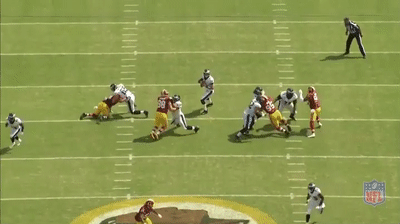We’re in the thick of the NFL offseason and it’s officially time to start fantasy football prep. I’ll be answering the biggest questions heading into the 2019 season; this is part of that series.
The Eagles managed to win Super Bowl 52 with backup quarterback Nick Foles, but not necessarily because of him. That deserves clarification with Carson Wentz looking a whole lot like the next big thing at quarterback.
Wentz hardly fell off a cliff in 2018; he posted career-best marks in completion rate (69.6%), yards per attempt (7.5) and passing yards per game (279.5). Still, the Eagles went from the third-ranked scoring offense in 2017 to the 18th-ranked unit in 2018.
Let’s breakdown exactly what went “wrong” for Wentz last season and what it could take for him to rebound in a big way for the 2019 season as both a real-life and fantasy football asset.
Carson Wentz Is at His Best Surrounded by Field-Stretchers
The Eagles franchise quarterback suffered the worst season of his career as a rookie in 2016. His top-three receivers were Jordan Matthews, Zach Ertz, Nelson Agholor and (throws up in mouth) Dorial Green-Beckham.
Things changed in 2017, as Philadelphia surrounded Wentz with new talent including Alshon Jeffery, Torrey Smith and rookie fourth-round speedster Mack Hollins. Three-receiver sets thus consisted of Jeffery and either Smith or Hollins on the outside with Agholor in the slot. This resulted in a massive Year 2 leap for Wentz, who was a frontrunner in the MVP conversation until he suffered a torn ACL in Week 13.
There were very few quarterbacks at the time capable of performing the type of witchcraft that Wentz was executing on a routine basis.

This quartette of talented pass-catching options, along with the continued presence of the offense’s all-world tight end Ertz, led to some elite deep-ball passing from Wentz that unfortunately wasn’t replicated in 2018. Replacing Smith with Mike Wallace made sense, but the veteran field-stretcher would ultimately spend all but two games on the injured reserve list with a fractured fibula. Hollins didn’t even play a game before landing on the injured reserve due to a groin injury.
Stripping Wentz of basically the only real speed the Eagles offense had to offer predictably derailed his once-elite deep-ball ability.
Carson Wentz on deep ball attempts in 2017 (with Torrey Smith + Mack Hollins):
QB Rating: 12th among 45 QBs
Y/A: 8th
Cmp: 12thIn 2018 (both Mike Wallace + Hollins were mostly hurt all season):
QB Rating: 30th among 45 QBs
Y/A: 17th
Cmp: 20thNow the Eagles have D-Jax #sheesh
— Ian Hartitz (@Ihartitz) May 2, 2019
Luckily, the Eagles took several measures to once again improve the level of talent surrounding their franchise quarterback.
Don’t Underestimate the Early Impact of DeSean Jackson, JJ Arcega-Whiteside
The Eagles addressed their need for a field-stretcher by signing the NFL’s premier speedster. They’re already all too familiar with the immediate impact D-Jax can have on any passing game.
QB yards per attempt with vs. without DeSean Jackson #SpeedKills
Donovan McNabb: 7.44 Y/A with vs. 7.02 Y/A without
Mike Vick: 7.79 vs. 6.44
Nick Foles: 8.13 vs. 6.58
Kirk Cousins: 8.42 vs. 7.53
Jameis Winston: 7.81 vs. 7.7
Ryan Fitzpatrick: 7.91 vs. 6.68 pic.twitter.com/1G0kGf6Lbm— Ian Hartitz (@Ihartitz) March 11, 2019
Jackson has 40 catches of 50-plus yards since 2008, more than six teams had over that span according to NBC Sports Philadelphia’s Dave Zangaro.
We also shouldn’t underestimate second-round pick Arcega-Whiteside. The former Stanford Cardinal is a bit more like Jeffery than D-Jax when it comes to size (6-foot-2 and 225 pounds), but his 4.49-second 40-yard dash indicates safeties shouldn’t stray too far when he’s on the field.
The Athletic’s Dane Brugler said, “The best compliment you can give a wideout is when everyone knows where the ball is going, yet it can’t be stopped — and that’s often how it felt studying Arcega-Whiteside in jump-ball situations.”
JJ Arcega-Whiteside has 2019 preseason MVP written all over him pic.twitter.com/kbCinlakmx
— Ian Hartitz (@Ihartitz) May 14, 2019
Arcega-Whiteside is by all accounts #good at football after scoring 28 touchdowns in his last 33 games as Stanford’s undisputed No. 1 receiver. His contributions in Year 1 could mostly be in red-zone packages, but JAWS possesses enough talent to be an immediate fantasy asset off the bench in a similar vein as backup Eagles tight end Dallas Goedert.
D-Jax and JAWS both have the type of big-play ability that Philadelphia was lacking last season. We can never confidently predict injuries, but the Eagles have the look of an explosive offense in 2019 if they can do a better job keeping Wentz upright.
Philly’s Offensive Line Wasn’t Great in 2018
Both Wentz’s deep-ball efficiency and the rate he attempted to test defenses downfield declined last season.
Carson Wentz’s Deep-Ball Rate by Season:
- 2016: 10.5% (32nd among all quarterbacks with 10-plus deep-ball attempts)
- 2017: 14.8% (seventh)
- 2018: 11.2% (T-26th)
While Wentz actually attempted a lower percentage of his passes under pressure in 2018 (31.3%) compared to 2017 (35.7%), he was forced to get rid of the ball quicker than we’ve previously seen. He also took sacks quicker than ever before.
Overall, the Eagles were No. 17 in Football Outsiders’ adjusted sack rate in 2018 after working as the No. 12 unit in 2017.
Getting rid of the ball quicker is sometimes a positive, but a big part of Wentz’s game is the ability to extend plays before taking chances down the field.
The Eagles return all five starters from a season ago and hope to be in a slightly healthier state entering Week 1.
- Left tackle Jason Peters was returning from a torn ACL and MCL while also battling quadriceps and biceps injuries.
- Left guard Isaac Seumalo missed three games due to a pectoral injury.
- Center Jason Kelce told reporters after the 2018 season that he played through a Grade 2 MCL sprain, broken foot and a torn elbow.
- Right guard Brandon Brooks played in all 16 regular-season games before tearing his Achilles during the Eagles’ Divisional Round loss to the Saints.
- Right tackle Lane Johnson missed one game with a Grade 2 MCL sprain before toughing out the injury for the rest of the season.
Better injury luck across the offensive line combined with the team’s most complete and explosive crop of receivers in years should make 2019 a make-or-break year for Wentz.
Wentz was just the QB17 in fantasy points per game last season (minimum eight starts) after ranking as the QB2 in 2017. He isn’t exactly free at his current QB9 average draft position, but his enhanced weapons and recent history of elite fantasy play makes his ceiling much higher than similarly-valued quarterbacks Philip Rivers and Jared Goff.
There’s a reason why the Eagles are presently favored to win the NFC East, and their quarterback’s ability to regain his once-elite play will be perhaps the team’s largest X-factor in achieving that goal.
Pictured above: Carson Wentz
Credit: Bill Streicher-USA TODAY Sports






